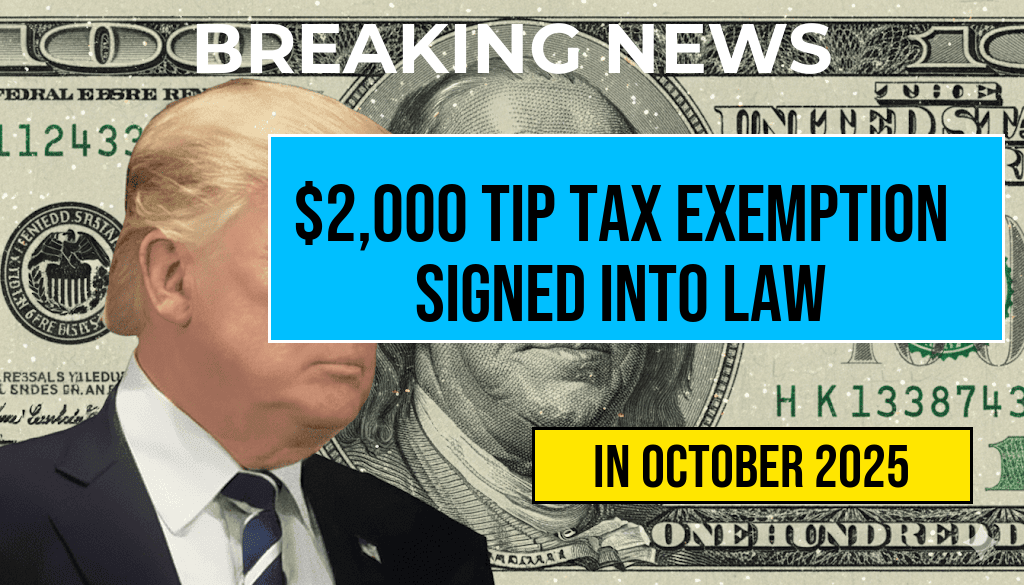Legislation exempting tips exceeding $2,000 from taxation has officially been enacted into law, prompting widespread discussion across service industries and tax policy circles. The new measure, signed into law by Congress last week, aims to address longstanding concerns over the tax implications of large gratuities, particularly in sectors such as high-end hospitality, private events, and luxury services. While supporters argue that the law provides relief for workers who frequently receive substantial tips, critics warn it could complicate tax enforcement and potentially foster tax evasion. As businesses and employees prepare for the implementation phase, financial experts and legal analysts are examining the potential economic and regulatory impacts of this significant shift in tax policy.
Understanding the New Tip Tax Exemption Law
Details of the Legislation
| Provision | Description |
|---|---|
| Exemption Threshold | Tips exceeding $2,000 per individual are exempt from federal income tax |
| Applicability | Primarily targets service workers in luxury sectors and high-net-worth clientele settings |
| Reporting Requirements | Employers must continue reporting tips but can exclude amounts above the exemption threshold |
| Effective Date | Legislation takes effect immediately, with provisions for phased enforcement |
The law amends existing tax codes, notably modifying the rules surrounding **tip reporting** and **taxable income** calculations. Under previous regulations, all tips were subject to federal income tax, regardless of amount, with employees required to report tips exceeding $20 per month. The new exemption introduces a threshold designed to alleviate the tax burden on workers receiving substantial gratuities, often in specialized service contexts.
Economic Implications for Service Industries
Potential Benefits for Workers and Employers
- Enhanced Income Retention: Workers in high-end sectors may retain more of their earnings, improving financial stability.
- Incentivization: Encourages employees to provide exceptional service without the concern of losing large tips to taxes.
- Business Competitiveness: Companies operating in luxury markets might attract top talent by offering more attractive compensation structures.
Possible Challenges and Concerns
- Tax Evasion Risks: The exemption could create loopholes for underreporting large tips or manipulating tip records.
- Enforcement Difficulties: Tax authorities may need additional resources to monitor and verify tip declarations exceeding the threshold.
- Impact on Revenue Collection: Reduced taxable income from large tips might slightly decrease federal tax revenues, though the overall effect remains uncertain.
Legal and Regulatory Considerations
Compliance Requirements
Employers in relevant sectors will need to update payroll systems to accommodate the new exemption rules. Accurate documentation of tips, especially those exceeding $2,000, will be essential to ensure proper reporting and avoid penalties. Additionally, employees must still report tips as part of their taxable income, even if they are exempt from withholding, maintaining adherence to IRS guidelines.
Stakeholder Reactions
Industry associations representing hospitality, luxury services, and event planning have generally welcomed the law, citing it as a recognition of the unique earning patterns within their sectors. Conversely, some tax advocacy groups express concern over the potential for increased tax fraud and reduced transparency, advocating for stricter enforcement measures.
Public and Political Responses
Supporters’ Perspectives
Proponents argue that the exemption acknowledges the realities of high-value gratuities, offering fairness and financial relief. They cite examples from industries like private clubs and concierge services, where tips can frequently surpass $2,000 per occasion. Legislative advocates contend that the measure promotes economic justice for workers who rely heavily on tips as a significant part of their income.
Opposition Views
Opponents warn that the law could complicate tax collection efforts, potentially leading to increased underground economic activity. Some lawmakers have called for additional oversight mechanisms to prevent abuse and ensure that the exemption does not incentivize underreporting or other forms of tax evasion.
Preparing for the Transition
Businesses and employees are advised to review their current tip recording practices and consult with tax professionals to ensure compliance with the new law. The IRS has announced upcoming guidance and resources to assist stakeholders in understanding their responsibilities under the updated regulations. As the law takes effect, monitoring of its practical impacts will be crucial for policymakers and industry leaders alike.
For further insight into tip reporting regulations and tax policy developments, visit the Wikipedia page on U.S. taxation and Forbes’ coverage on tax reforms.
Frequently Asked Questions
What is the Two-Thousand Dollar Tip Tax Exemption legislation?
The Two-Thousand Dollar Tip Tax Exemption legislation is a new law that exempts tips up to $2,000 from taxation, providing relief to service industry workers. It aims to reduce the tax burden on employees who receive substantial tips.
When does the tip tax exemption legislation take effect?
The legislation was signed into law recently and will take effect starting from the upcoming tax year. Workers and employers should prepare for changes in how tip income is reported and taxed.
How will this legislation impact service industry workers?
This legislation will reduce the taxable income for service industry workers who receive tips, potentially increasing their take-home pay. Workers should still keep accurate records of their tips to comply with reporting requirements.
Are there any reporting requirements associated with the tip exemption?
Yes, workers are still required to report tips received to their employers and on their tax returns, even if tips up to $2,000 are exempt from taxation. Proper documentation ensures compliance and avoids penalties.
What should employers do to prepare for this new legislation?
Employers should update payroll processes to reflect the exemption, inform employees about the changes, and ensure accurate record-keeping to comply with tax laws. Consulting with tax professionals is also recommended for smooth implementation.






